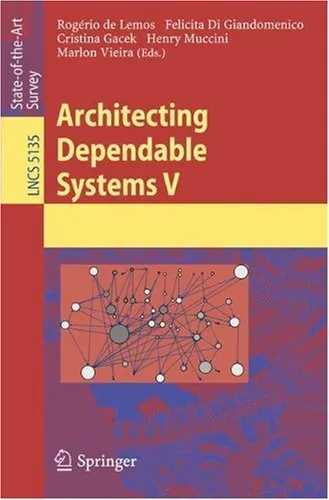Architecting Dependable Systems V
4.2
بر اساس نظر کاربران

شما میتونید سوالاتتون در باره کتاب رو از هوش مصنوعیش بعد از ورود بپرسید
هر دانلود یا پرسش از هوش مصنوعی 2 امتیاز لازم دارد، برای بدست آوردن امتیاز رایگان، به صفحه ی راهنمای امتیازات سر بزنید و یک سری کار ارزشمند انجام بدینکتاب های مرتبط:
معرفی کامل کتاب 'Architecting Dependable Systems V'
خلاصهای از کتاب
این کتاب در زمینههای مختلفی از جمله طراحی سیستمهای مقاوم در برابر خرابیها، امنیت سیستمها و بهبود عملکرد آنها، به خواننده بینشی عمیق و کاربردی ارائه میدهد. تمرکز اصلی در این جلد از مجموعه به معرفی روشها و تکنیکهای جدید جهت افزایش اطمینانپذیری و مقابله با چالشهای پذیرفتهشده و نوظهور در این حوزه است. کتاب به تحولات اخیر در طراحی سیستمها نگاهی ژرف دارد و با استفاده از مثالهای مشخص و مطالعاتی به راهحلهای نوین و کاربردی میپردازد.
نکات کلیدی
- معرفی تکنیکهای مدرن برای طراحی سیستمهای اطمینانپذیر.
- بررسی چالشهای جدید در زمینه امنیت و پایداری سیستمها.
- ارائه الگوهای طراحی نوین و کاربردی برای سیستمهای پیچیده.
- تعداد زیادی از مثالها و مطالعات موردی در کاربردهای واقعی و عملی.
جملات معروف از کتاب
«هنگامی که از سیستمها انتظار داریم که بدون نقص کار کنند، نیازمند معماریهایی هستیم که در قلب خود اطمینانپذیری را جای دادهاند.»
«معماری سیستمهای اطمینانپذیر نیازمند ترکیبی از علم، هنر و تجربه است که همه باهم برای رسیدن به هدف نهایی که همان عملکرد بینقص است، همکاری میکنند.»
چرا این کتاب مهم است؟
اهمیت این کتاب نه تنها در پوشش جامع آن از مفاهیم و تکنیکهای طراحی سیستمهای اطمینانپذیر است، بلکه در روشهای کاربردی و تجزیه و تحلیل عمیق آن است که میتواند به مهندسان و طراحان سیستمها کمک کند تا پایداری و امنیت سیستمها را بهبود بخشند. ارائه دیدگاههای جدید و استفاده از فناوریهای نوین در این کتاب، آن را به یکی از منابع ضروری برای توسعهدهندگانی که در این عرصه فعالیت میکنند تبدیل کرده است.
In an era defined by technology, the need for dependable systems has never been more critical. "Architecting Dependable Systems V" serves as a comprehensive guide in exploring and developing architectures that exhibit high levels of reliability, safety, and security, catering to a myriad of fields from distributed computing to embedded systems and beyond. Aimed at researchers, practitioners, and students alike, this book belongs to the series that seeks to unite insights in the creation and maintenance of dependable systems. It captures the essence of resilience engineering, offering theoretical underpinnings alongside practical insights.
Detailed Summary
The book puts forth a detailed examination of the intricacies involved in designing systems that can withstand both foreseeable and unforeseen disruptions. It consists of various papers presented by experts in the field, each contributing unique methodologies and case studies that illustrate the role of architecture in ensuring system dependability. Through an interdisciplinary approach, the book navigates through the challenges and solutions associated with system anomalies, offering strategies that encompass fault tolerance, redundancy, and recovery processes. The architecture of dependable systems encapsulated in this volume not only emphasizes robustness but also adaptability in rapidly evolving technological landscapes.
Key Takeaways
- The importance of integrating dependability into all stages of system design and development.
- Insights into the application of fault-tolerance and its role in enhancing system reliability.
- Understanding how redundancy and architecture-based recovery strategies minimize risks.
- Strategies for architecting systems that are both robust and adaptable to change.
- The latest research advancements and real-world applications in dependable system architecture.
Famous Quotes from the Book
"Dependability is not a luxury; it is a fundamental requirement in the fabric of modern computing systems."
"Architecting systems for dependability demands not only technical acumen but also a comprehensive understanding of the complex socio-technical landscapes."
Why This Book Matters
This book is paramount in bridging the gap between theoretical frameworks and practical applications in dependable systems. With cyber threats and system failures posing significant risks to both individuals and organizations, a robust understanding of dependable system architecture provides a safeguard against such adversities. By delving into both classical and contemporary theories while marrying them with empirical studies, the book ensures that readers are equipped with both knowledge and practical skills. Furthermore, the contributions in this volume are pivotal for fostering an environment where safety, security, and reliability are at the forefront of technological advancements.
دانلود رایگان مستقیم
برای دانلود رایگان این کتاب و هزاران کتاب دیگه همین حالا عضو بشین
برای خواندن این کتاب باید نرم افزار PDF Reader را دانلود کنید Foxit Reader
دسترسی به کتابها از طریق پلتفرمهای قانونی و کتابخانههای عمومی نه تنها از حقوق نویسندگان و ناشران حمایت میکند، بلکه به پایداری فرهنگ کتابخوانی نیز کمک میرساند. پیش از دانلود، لحظهای به بررسی این گزینهها فکر کنید.
این کتاب رو در پلتفرم های دیگه ببینید
WorldCat به شما کمک میکنه تا کتاب ها رو در کتابخانه های سراسر دنیا پیدا کنید
امتیازها، نظرات تخصصی و صحبت ها درباره کتاب را در Goodreads ببینید
کتابهای کمیاب یا دست دوم را در AbeBooks پیدا کنید و بخرید



